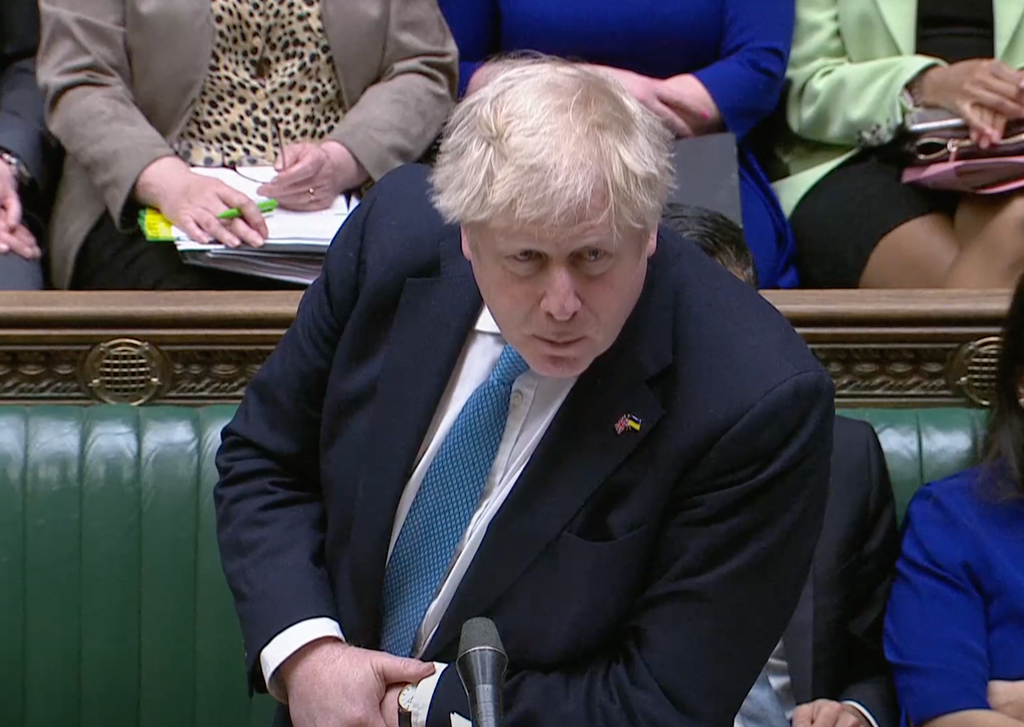
Boris Johnson said it appeared P&O Ferries had “broken the law” by sacking 800 workers without notice, as he vowed that the government would “take them to court”.
“It looks to me as though the company has broken the law,” the prime minister told the Commons at PMQs. “We will be taking action therefore, and we will be encouraging workers to take action.”
Mr Johnson claimed P&O Ferries had a duty to notify the government about the sackings 45 days before the move – promising that the firm “aren’t going to get away with it”.
But Labour leader Sir Keir Starmer accused the PM of “half arsed bluster and waffle” on the firings, and said he was “all mouth, no trousers” on employment rights.
The PM’s pledge of legal action comes as it emerged that the ferry company felt able to sack 800 staff without warning about because of a law change brought in by former minister Chris Grayling.
The ex-transport secretary quietly amended legislation in 2018 meant to protect workers to create an exemption where there are mass redundancies on ships registered overseas.
But Mr Johnson said the government would not “sit by” over the mass sackings – and said that under section 194 of the Trade Union and Labour Relations (Consolidation) Act 1992 it appeared the ferry giant had broken the law.
The legislation means consultation must begin at least 45 days before the first dismissal takes place if a company wants to making more than 100 employees redundant.
It also means companies are under a duty to notify the government of the proposal to dismiss 45 days before the first dismissal.
The PM told the Commons: “We are taking legal action against the company concerned – that is the right thing to do because it seems to me they have broken the law … We’ll take them to court. We’ll defend the rights of British workers.”
Mr Johnson added: “P&O plainly aren’t going to get away with it any more than any other company that treat its employees in that scandalous way.”
The Commons clash came as the company’s chief executive issued an apology for the impact of sacking staff without notice – but insisted the firm had acted legally.
Peter Hebblethwaite said he understood the “anger and shock” about the loss of jobs, but highlighted the apparent loophole in a letter to business secretary Kwasi Kwarteng.
“The very clear statutory obligation in the particular circumstances that applied was for each company to notify the competent authority of the state where the vessel is registered,” he wrote.
Kevin Barnett, head of employment at marine law specialists Lester Aldridge LLP, said that Mr Grayling’s 2018 amendment meant that it was “incorrect” for the government to threaten the ferry company over notification rules.
“The amendment states the notification must be made to the competent authority of the state where the ship is registered, instead of the secretary of state,” he said.
Sir Keir said the prime minister “had not lifted a finger” to prevent the sackings last week. “If the prime minister can’t stop that, what’s the point of his government?”
The Labour leader said workers he has spoken to are worried they could be next if P&O is allowed to “get away with it”, adding: “Why does the prime minister think that they will take a crumb of comfort from his half-arsed bluster and waffle today?”
The opposition leader also pointed out that as the law stands, it is not illegal to pay seafarers below the national minimum wage – even if they are working at UK ports and in UK waters.
Sir Keir said: “Two years ago, prime minister, his government admitted that that was unjustifiable … British workers don’t need another empty review, they need action. So when will the prime minister fix that gap in the law?”
Mr Johnson replied: “We are going to address the defects in the 1998 Living Wage Act … and make sure that everybody serving in the UK exclusive economic zone, work in the UK exclusive economic zone gets paid the living wage as people do in the rest of the country.”







